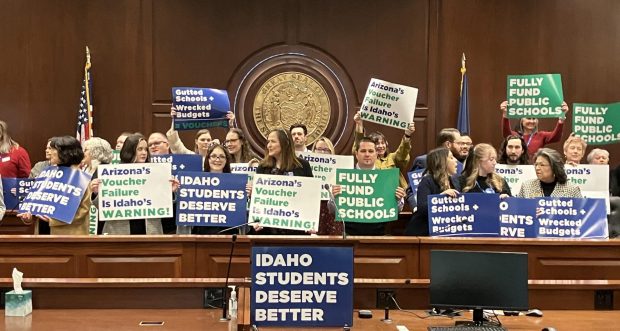Public school educators Monday rallied at the Statehouse to protest legislation to direct taxpayer funds to private school and home-school students.
Holding signs that read “fully fund public schools” and “Arizona’s voucher failure is Idaho’s warning,” members of the Idaho Education Association, the Idaho Association of School Administrators and the Idaho School Boards Association called on lawmakers to reject private school vouchers, education savings accounts or tax credits.
“This press conference is intended to leave no question,” said IEA executive director Paul Stark, “that the good Idahoans who work in our public schools each and every day oppose vouchers in any form.”
Two different private school choice bills are expected to debut this week, Stark said. Monday was also IEA Lobby Day, when hundreds of members of the teachers’ union descended on the Capitol for face time with lawmakers.
During the news conference, teachers and administrators pointed to potential pitfalls of a private school choice program — from diverting public funds away from rural public schools to exclusive admissions limiting access to private schools.
“If you hold a decisionmaking authority role anyplace in public education, whether it be a local school board, state Legislature or the office of the governor, I’m going to ask you to please, please invest in your public schools that are accessible to all Idaho students,” said Melyssa Ferro, a Caldwell educator, former Idaho Teacher of the Year and IEA board member.
Former Rep. Julie Yamamoto, a Caldwell Republican and longtime critic of private education spending, called out problems with Arizona’s private school choice program, including ballooning costs and instances of fraud.
“I firmly believe that public tax dollars should follow the student,” Yamamoto said, “and it should follow the student into Idaho’s system of common, free public schools.”

House begins rule review — including academic standards and graduation requirements
House members took a first look at education rules — setting the stage for some big votes later this session.
“We intend to move deliberately with the rules,” House Education Committee Chairman Douglas Pickett, R-Oakley, said at the end of the committee’s Monday meeting.
While often arcane, the rulemaking process is important. Once approved, agency rules carry the force of law.
As planned, Monday’s meeting was an overview of Idaho Department of Education and State Board of Education rules. Among the rules on the agenda:
- Academic standards, including social studies, arts and humanities, computer science and driver’s education. The standards review isn’t new; the Education Department reviews and renews the standards on a rotating, six-year basis. But the standards review can often be contentious, providing lawmakers a vehicle to weigh in on what Idaho schools teach, and why.
- Graduation requirements. State superintendent Debbie Critchfield wants the state to update its high school graduation requirements for the first time in more than a decade. The changes would include a required course in digital literacy, and a “future readiness project” that would replace a senior project.
- Special education. This rule would update Idaho’s special education manual, in an attempt to bring it into federal compliance. In late 2023, the U.S. Department of Education said the state’s definition of “specific learning disability” was too restrictive, denying students special education services.
JFAC probes State Board scholarship programs
Republicans on the Joint Finance-Appropriations Committee have tasked the State Board of Education with compiling a progress report on scholarships, signaling the budget committee may take a closer look at the state-funded programs.
The State Board Monday presented its $37 million budget request for the scholarships and grants it oversees, including:
- The Rural and Underserved Educator Incentive Program.
- The Opportunity Scholarship.
- The Armed Forces and Public Safety Officer Scholarship.
- GEAR UP federal scholarships.
- The Atwell Parry Work Study Program.
Rep. Steve Miller, R-Fairfield, requested performance metrics on the scholarships, including the rate at which recipients complete their academic programs, while Rep. Wendy Horman, R-Idaho Falls, honed in on the rural and underserved educator program.
Horman called for data that shows which school districts are hosting rural and underserved teachers and shows whether the program is impacting recruitment and retention. She also asked for an explanation on the “distinction between rural and whatever your definition is of underserved.”
“This program is far enough along that we should have that data,” said Horman, co-chair of the budget committee.
State Board executive director Josh Whitworth didn’t have much data to share but promised to return with the requested information. He also touted the scholarships’ impact for low-income students.
“The available money to pay for school is one of the largest indicators of students having the ability to move on,” he said. “I think each of these scholarships have provided some impact on that.”
Senate Education moves quickly though confirmations
A former state senator had a quick and amicable confirmation hearing before the Senate Education Committee Monday.
The committee didn’t vote on Shawn Keough’s reappointment to the State Board of Education, for a second five-year term running through 2029.

But Keough received only one question — on building relationships between charter schools and traditional schools. Keough said the two sectors could learn from each other, and the Legislature has a role to play in this process.
And Keough, a Sandpoint Republican, received plaudits from Sen. Carrie Semmelroth, D-Boise, who thanked Keough for her 30 years of public service.
Keough served 22 years in the Senate, including 18 years on the Joint Finance-Appropriations Committee. She retired from the Legislature in 2018 and was appointed to the State Board in 2019.
Senate Education will vote on Keough’s confirmation at a future meeting.
The committee also moved quickly Monday on two Idaho Public Charter School Commission appointments.
The committee unanimously endorsed Lisa Paulos of Jerome for an appointment running through May 2028. That confirmation now goes to the Senate floor.
The committee also held a brief confirmation hearing for Wally Hedrick of Eagle, and will vote at a later date. Hedrick is seeking an appointment running through May 2027.
